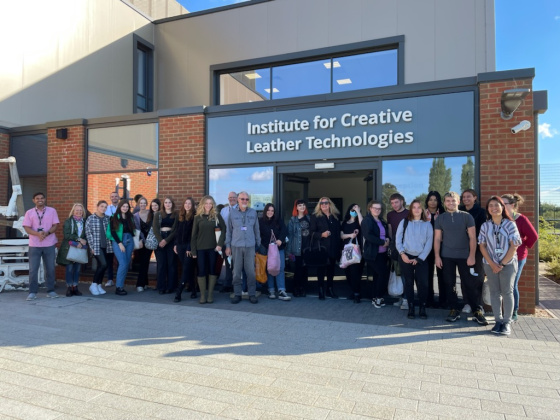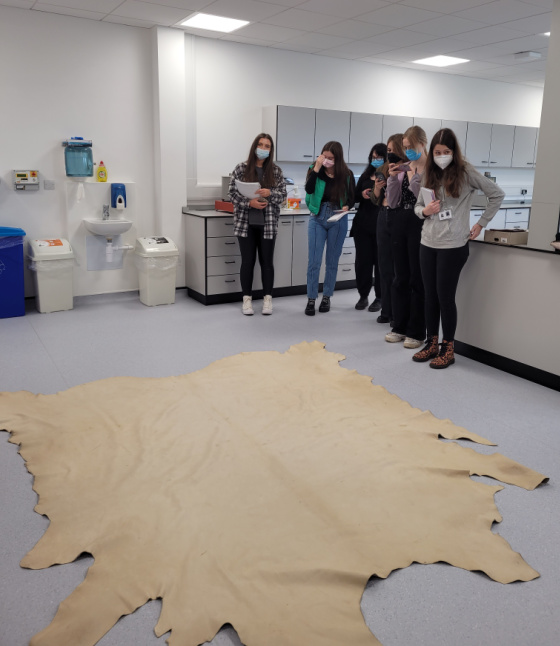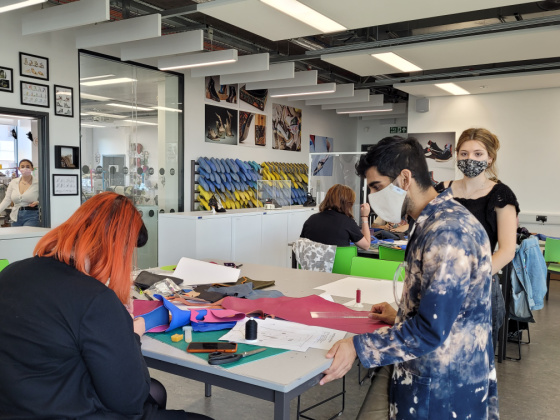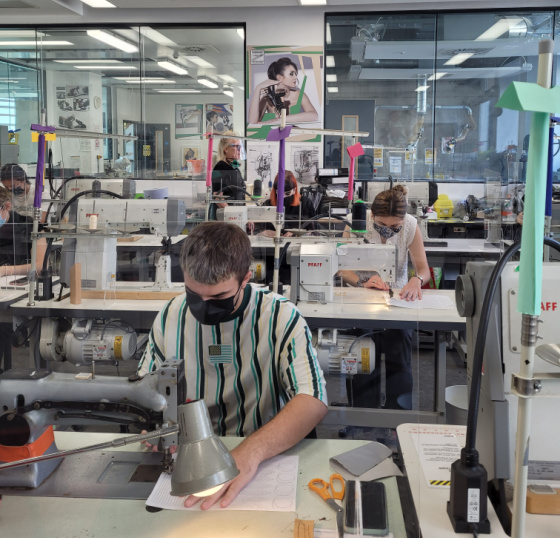De Montfort University Leicester (DMU) students gained invaluable industry knowledge and skills in working with leather as a sustainable material, during an exclusive annual workshop.

Following the cancellation of DMU’s leather school in 2020 due to Covid-19, it relaunched this year with a renewed focus on sustainability and technical enhancement for students across a wide range of arts and design disciplines.
Sponsored by DMU partner The Leathersellers’ Company, a historic livery company devoted to supporting charity and education around the British leather trade, it gave 20 final-year students a chance to master skills in working with leather techniques.
Students spent the first day at the University of Northampton’s Institute for Creative Leather Technologies, visiting a working tannery and a leather lab to learn about the material’s journey, its properties, the range of hides used across different applications, and the restrictions and legislation around skin from rare species, as well as the contemporary methods used to replicate those effects.

Examining a cow hide at the Institute for Creative Leather Technologies
The rest of the week took place on DMU’s campus, where students utilised the cutting-edge facilities to hone a host of leatherworking techniques including machine stitching, hand stitching, inserting zips, making pockets, creating gussets, skiving and edging, embossing and laser cutting.
The leather school was mentored by award-winning designer and leather craftsman Yusuf Osman, whose signature handbag gained prestigious recognition from The Leathersellers' Company this year.
Yusuf said: “Leather is the first and only truly sustainable material as it’s a by-product of the meat industry. Although it’s expensive, it lasts a lifetime, and unlike synthetic materials, it doesn’t pollute our waterways. This is why we should be promoting its use to the future generation of designers.
“During the week I taught students highly sought-after fine leatherworking skills, which they practised by designing and making a handbag. Knowing how to actually make their designs will lead to more efficient production – another great skill to have when entering their respective industries.
“It’s been a pleasure teaching at DMU and I’m really impressed by its industry-standard facilities – I hope the students realise just how lucky they are.”

Students being mentored by Yusuf Osman at DMU
One of the students who attended the workshop was Contour Fashion’s Ellie Jones, who scooped the £1,000 first prize in this year’s Leathersellers’ Design Awards, after impressing the judges by utilising cutting-edge technology to create a hooded cowl neck playsuit and cropped jacket in suede.
She said: “Although the conversations surrounding leather can be controversial, I think the experience has made me aware of the extent to which the leather industry has such a positive and sustainable influence on the world around us.”
Textile Design student Charlie Jones was commended in this year’s Leathersellers’ Design Awards, winning £200 for his backing fabric which was made by painstakingly weaving long strips of mohair and leather by hand, and using a heat press to bind it together at the end.
“During the workshop I discovered hairsheep leather, which is so soft and flexible, and I’m definitely interested in exploring ways I can use it in my final collection,” said Charlie.
“Also, learning how to use some of the big industrial machines at DMU that aren’t traditionally associated with my degree has opened up my eyes to how I can work with leather in the future.”

Using DMU's industrial sewing machines
Kyle Norton, a Design Crafts student specialising in glass blowing and ceramics, said: “I’d never worked with leather before and I’m so happy I did this. I’m now considering a collection mixing ceramics with leather, so it’s opened up a whole new playing ground for me.”
Contour Fashion student Hazel Emery, who has a passion for corsetry, said: “I’ve made faux leather corsets before, but knowing there are so many types of flexible and sustainable leather options that I can explore is a game-changer.”
Gillian Proctor, Associate Professor for Enterprise at DMU, first contacted The Leathersellers’ Company in 1982 when one of her Contour Fashion students was struggling financially, and the partnership between the company and university has gone from strength-to-strength ever since.
She said: “Despite its sustainable credentials, one of the biggest challenges for students working with leather is its expense. We are indebted to The Leathersellers’ Company, who are striving to support DMU in making it accessible so that students from all economic backgrounds can engage with this fabulous, sustainable and wide-ranging material.
“This experience gives these students the confidence to embrace leather into their own disciplines and utilise technical skills mastered this week. It forms an effective base from which they can push the parameters of leather innovation for The Leathersellers’ Design Awards 2022.”
Posted on Tuesday 5 October 2021